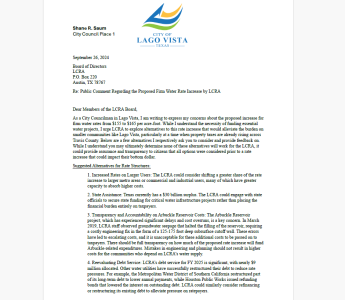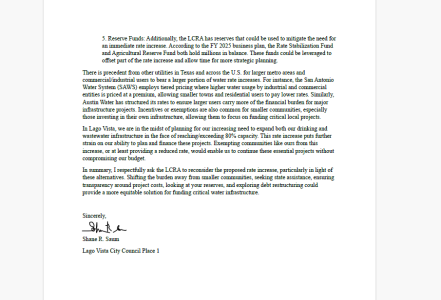Council,
The LCRA has proposed an increase for firm water rates from $155 to $165 per acre-foot. This has the potential to lead to our own water rate increase or our neighboring communities. I have drafted the following letter and submitted it to the LCRA to consider alternatives to raising the rate. I ask that you consider copying and sending a similar letter as we work to keep costs down for our citizens.
You can submit the comments here by Oct. 11th:
 lcra.formstack.com
lcra.formstack.com
September 26, 2024
Board of Directors
LCRA
P.O. Box 220
Austin, TX 78767
Re: Public Comment Regarding the Proposed Firm Water Rate Increase by LCRA
Dear Members of the LCRA Board,
As a City Council(man) in Lago Vista, I am writing to express my concerns about the proposed increase for firm water rates from $155 to $165 per acre-foot. While I understand the necessity of funding essential water projects, I urge LCRA to explore alternatives to this rate increase that would alleviate the burden on smaller communities like Lago Vista, particularly at a time when property taxes are already rising across Travis County. Below are a few alternatives I respectively ask you to consider and provide feedback on. While I understand you may ultimately determine none of these alternatives will work for the LCRA, it could provide assurance and transparency to citizens that all options were considered prior to a rate increase that could impact their bottom dollar.
Suggested Alternatives for Rate Structures:
1. Increased Rates on Larger Users: The LCRA could consider shifting a greater share of the rate increase to larger metro areas or commercial and industrial users, many of which have greater capacity to absorb higher costs.
2. State Assistance: Texas currently has a $30 billion surplus. The LCRA could engage with state officials to secure state funding for critical water infrastructure projects rather than placing the financial burden entirely on taxpayers.
3. Transparency and Accountability on Arbuckle Reservoir Costs: The Arbuckle Reservoir project, which has experienced significant delays and cost overruns, is a key concern. In March 2019, LCRA staff observed groundwater seepage that halted the filling of the reservoir, requiring a costly engineering fix in the form of a 125-175 foot deep subsurface cutoff wall. These errors have led to escalating costs, and it is unacceptable for these additional costs to be passed on to taxpayers. There should be full transparency on how much of the proposed rate increase will fund Arbuckle-related expenditures. Mistakes in engineering and planning should not result in higher costs for the communities who depend on LCRA's water supply.
4. Reevaluating Debt Service: LCRA’s debt service for FY 2025 is significant, with nearly $9 million allocated. Other water utilities have successfully restructured their debt to reduce rate pressures. For example, the Metropolitan Water District of Southern California restructured part of its long-term debt to lower annual payments, while Houston Public Works issued refunding bonds that lowered the interest on outstanding debt. LCRA could similarly consider refinancing or restructuring its existing debt to alleviate pressure on ratepayers.
5. Reserve Funds: Additionally, the LCRA has reserves that could be used to mitigate the need for an immediate rate increase. According to the FY 2025 business plan, the Rate Stabilization Fund and Agricultural Reserve Fund both hold millions in balance. These funds could be leveraged to offset part of the rate increase and allow time for more strategic planning.
There is precedent from other utilities in Texas and across the U.S. for larger metro areas and commercial/industrial users to bear a larger portion of water rate increases. For instance, the San Antonio Water System (SAWS) employs tiered pricing where higher water usage by industrial and commercial entities is priced at a premium, allowing smaller towns and residential users to pay lower rates. Similarly, Austin Water has structured its rates to ensure larger users carry more of the financial burden for major infrastructure projects. Incentives or exemptions are also common for smaller communities, especially those investing in their own infrastructure, allowing them to focus on funding critical local projects.
In Lago Vista, we are in the midst of planning for our increasing need to expand both our drinking and wastewater infrastructure in the face of reaching/exceeding 80% capacity. This rate increase puts further strain on our ability to plan and finance these projects. Exempting communities like ours from this increase, or at least providing a reduced rate, would enable us to continue these essential projects without compromising our budget.
In summary, I respectfully ask the LCRA to reconsider the proposed rate increase, particularly in light of these alternatives. Shifting the burden away from smaller communities, seeking state assistance, ensuring transparency around project costs, looking at your reserves, and exploring debt restructuring could provide a more equitable solution for funding critical water infrastructure.
Sincerely,
<Insert Name>
Lago Vista City Council
The LCRA has proposed an increase for firm water rates from $155 to $165 per acre-foot. This has the potential to lead to our own water rate increase or our neighboring communities. I have drafted the following letter and submitted it to the LCRA to consider alternatives to raising the rate. I ask that you consider copying and sending a similar letter as we work to keep costs down for our citizens.
You can submit the comments here by Oct. 11th:
LCRA Firm Water Rate Comment Form - Formstack
September 26, 2024
Board of Directors
LCRA
P.O. Box 220
Austin, TX 78767
Re: Public Comment Regarding the Proposed Firm Water Rate Increase by LCRA
Dear Members of the LCRA Board,
As a City Council(man) in Lago Vista, I am writing to express my concerns about the proposed increase for firm water rates from $155 to $165 per acre-foot. While I understand the necessity of funding essential water projects, I urge LCRA to explore alternatives to this rate increase that would alleviate the burden on smaller communities like Lago Vista, particularly at a time when property taxes are already rising across Travis County. Below are a few alternatives I respectively ask you to consider and provide feedback on. While I understand you may ultimately determine none of these alternatives will work for the LCRA, it could provide assurance and transparency to citizens that all options were considered prior to a rate increase that could impact their bottom dollar.
Suggested Alternatives for Rate Structures:
1. Increased Rates on Larger Users: The LCRA could consider shifting a greater share of the rate increase to larger metro areas or commercial and industrial users, many of which have greater capacity to absorb higher costs.
2. State Assistance: Texas currently has a $30 billion surplus. The LCRA could engage with state officials to secure state funding for critical water infrastructure projects rather than placing the financial burden entirely on taxpayers.
3. Transparency and Accountability on Arbuckle Reservoir Costs: The Arbuckle Reservoir project, which has experienced significant delays and cost overruns, is a key concern. In March 2019, LCRA staff observed groundwater seepage that halted the filling of the reservoir, requiring a costly engineering fix in the form of a 125-175 foot deep subsurface cutoff wall. These errors have led to escalating costs, and it is unacceptable for these additional costs to be passed on to taxpayers. There should be full transparency on how much of the proposed rate increase will fund Arbuckle-related expenditures. Mistakes in engineering and planning should not result in higher costs for the communities who depend on LCRA's water supply.
4. Reevaluating Debt Service: LCRA’s debt service for FY 2025 is significant, with nearly $9 million allocated. Other water utilities have successfully restructured their debt to reduce rate pressures. For example, the Metropolitan Water District of Southern California restructured part of its long-term debt to lower annual payments, while Houston Public Works issued refunding bonds that lowered the interest on outstanding debt. LCRA could similarly consider refinancing or restructuring its existing debt to alleviate pressure on ratepayers.
5. Reserve Funds: Additionally, the LCRA has reserves that could be used to mitigate the need for an immediate rate increase. According to the FY 2025 business plan, the Rate Stabilization Fund and Agricultural Reserve Fund both hold millions in balance. These funds could be leveraged to offset part of the rate increase and allow time for more strategic planning.
There is precedent from other utilities in Texas and across the U.S. for larger metro areas and commercial/industrial users to bear a larger portion of water rate increases. For instance, the San Antonio Water System (SAWS) employs tiered pricing where higher water usage by industrial and commercial entities is priced at a premium, allowing smaller towns and residential users to pay lower rates. Similarly, Austin Water has structured its rates to ensure larger users carry more of the financial burden for major infrastructure projects. Incentives or exemptions are also common for smaller communities, especially those investing in their own infrastructure, allowing them to focus on funding critical local projects.
In Lago Vista, we are in the midst of planning for our increasing need to expand both our drinking and wastewater infrastructure in the face of reaching/exceeding 80% capacity. This rate increase puts further strain on our ability to plan and finance these projects. Exempting communities like ours from this increase, or at least providing a reduced rate, would enable us to continue these essential projects without compromising our budget.
In summary, I respectfully ask the LCRA to reconsider the proposed rate increase, particularly in light of these alternatives. Shifting the burden away from smaller communities, seeking state assistance, ensuring transparency around project costs, looking at your reserves, and exploring debt restructuring could provide a more equitable solution for funding critical water infrastructure.
Sincerely,
<Insert Name>
Lago Vista City Council


